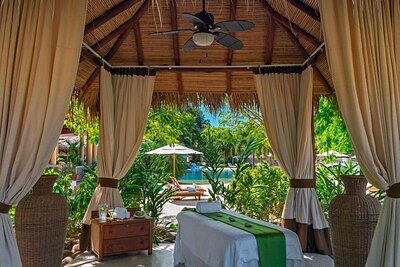
Marriott Doubles Down on Wellness Tourism with Ancestral Rituals & Sustainable Spas
As wellness travel surges, Marriott expands its portfolio of immersive experiences, blending ancient traditions, natural therapies, and eco-conscious practices to cater to a growing demand for holistic escapes.
Marriott Doubles Down on Wellness Tourism with Ancestral Rituals & Sustainable Spas
Guatapé, Colombia – Marriott International is aggressively expanding its presence in the booming wellness tourism sector, rolling out a series of immersive experiences that blend ancient traditions, natural therapies, and a growing commitment to sustainable practices. From Inca-inspired rituals in Peru to forest bathing in Costa Rica, the hotel giant is catering to a rapidly expanding demographic of travelers seeking authentic, restorative, and responsible getaways.
Wellness tourism is no longer a niche market. Valued at $720.4 billion in 2019, before the pandemic, the Global Wellness Institute predicts continued growth, fueled by a heightened awareness of mental and physical wellbeing. Marriott’s latest initiatives signal a strategic response to this trend, moving beyond standard spa offerings to create deeply experiential journeys.
Immersive Experiences Rooted in Culture & Nature
The centerpiece of Marriott’s expansion is a series of unique programs that leverage local culture and natural environments. In Cusco, Peru, JW Marriott El Convento Cusco offers an ancestral ritual inspired by the Inca era, utilizing medicinal plants like muña and eucalyptus alongside natural oxygen therapy to combat altitude sickness. This immersive experience, conducted in a subterranean spa inspired by the Inca calendar, is drawing significant interest from travelers seeking a connection to Peru’s rich history.
“Travelers are increasingly looking for authenticity and experiences that go beyond superficial relaxation,” explains one hospitality analyst. “They want to connect with the local culture and learn something new. Marriott is responding by offering programs that are deeply rooted in the history and traditions of the destinations.”
Palacio del Inka, a Luxury Collection hotel in Cusco, complements this approach with Andean therapies that incorporate ingredients like quinoa, coca, and sacred clays. Further south, in Costa Rica, The Westin Reserva Conchal and W Costa Rica – Reserva Conchal are capitalizing on the country’s lush rainforests, offering forest bathing (Shinrin-yoku) sessions and treatments that incorporate local flora and fauna.
“The idea is to tap into the healing power of nature,” says a wellness expert. “Forest bathing, for example, has been shown to reduce stress, boost immunity, and improve mood. Marriott is recognizing the growing demand for these types of experiences.”
A Competitive Landscape
Marriott isn’t alone in capitalizing on the wellness trend. Competitors like Hyatt and Hilton are also expanding their spa offerings and introducing experiential programs. Hyatt recently announced new wellness initiatives at properties in Chesapeake Bay, Lake Tahoe, and Hawaii, focusing on immersive experiences like cryotherapy, bioacoustic mats, and sound healing. Hilton is emphasizing eco-luxury and integrating local scents and ingredients into its spa treatments, with properties in Japan, Mexico, and the Caribbean offering unique, regionally inspired experiences.
“The competition is fierce,” admits one hotel executive. “Everyone is trying to differentiate themselves by offering something unique and appealing to the wellness traveler. The key is to create experiences that are authentic, immersive, and sustainable.”
Sustainability: A Growing Priority
While cultural immersion is a key component of Marriott’s strategy, a growing emphasis on sustainability is becoming increasingly important. The Westin Reserva Conchal's commitment to eco-friendly practices, earning it a “5 Leaves” award, demonstrates a growing awareness of the need to minimize environmental impact. Many of Marriott’s wellness programs inherently align with sustainable tourism principles, utilizing local ingredients, supporting local communities, and promoting the preservation of natural environments.
“Guests are becoming more aware of the environmental impact of their travel,” notes a sustainability consultant. “They are looking for hotels and resorts that are committed to responsible practices. Marriott is responding by integrating sustainability into its wellness offerings.”
For instance, Nekajui, a Ritz-Carlton Reserve in Costa Rica, has introduced treatments inspired by the Nicoya Peninsula’s ancient healing traditions and local botanicals, underscoring its commitment to preserving the area’s biodiversity and cultural heritage.
The Future of Wellness Travel
As wellness tourism continues to evolve, Marriott’s strategy of blending cultural immersion, natural therapies, and sustainable practices positions it well to capture a significant share of the market. The demand for authentic, transformative experiences is only expected to grow, driven by a greater emphasis on mental and physical wellbeing.
“The future of travel is about more than just ticking off destinations,” concludes a travel industry expert. “It’s about creating meaningful connections, experiencing different cultures, and taking care of ourselves and the planet. Marriott is recognizing this shift and adapting its offerings accordingly.”
With its expanding portfolio of immersive experiences and growing commitment to sustainability, Marriott is poised to lead the way in the evolving landscape of wellness travel, offering guests a chance to rejuvenate, reconnect, and experience the world in a more meaningful way.
